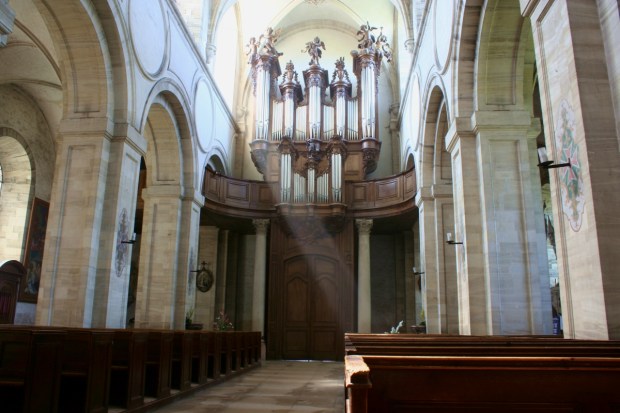A few hours after the D-Day landings on June 6, 1944, the first bombs fell on the Abbey of Mondaye (Normandy, France). The Canons Regular and a community of nuns took shelter in the monastery's vaulted cellar, soon joined by refugees from the surrounding area. Soon after, on June 7, the English stormed into the abbey, but were immediately dislodged by German soldiers who had camouflaged their tanks nearby.
They survived for five weeks, while the terrible "battle of the hedgerows" raged around them.
In the cellar, the refugees organized their life. After two days of bombardment, during which it was impossible to say Mass in its entirety, they tried to repeat the services. On June 8, the Feast of Corpus Christi, they celebrated Mass on an altar set up in the cellar. Every evening, after prayers, there would be a benediction with the Blessed Sacrament.
General absolution
From that night until June 10, there was violent gunfire outside. In an issue of the newspaper Courrier de Mondaye published in 1994, Br. Godefroy recalled:
“At around 5 p.m. that same day, a deluge of iron and fire fell on the abbey. It was the English who launched their attack. For almost half an hour, the noise was infernal. We all retreated to the back of the cellar, praying while our teeth chattered. Fr. Maurice gave us general absolution."
It was then that an astonishing phenomenon occurred, noticed by all the refugees and reported by Br. Godefroy:
“From the cellar, in the midst of the din, we could regularly hear the church organ playing.”
Who could have had the audacity to enter the abbey church, whose tall steeple served as a target for the English, to climb to the rostrum while all the walls shook on their foundations, to settle down at the organ and play Bach fugues, which the discerning ear of the organist brother was able to recognize? Was this a dream or an improbable reality?

They’d have to wait a decade or so after the war to unravel this mystery. One day, Br. Godefroy was celebrating a wedding. During the Mass, one of the guests, a German Lutheran pastor, joined him in the organ loft. Br. Godefroy asked him to play the exit.
The mystery unraveled
“The pastor sits down at the console and plays a magnificent closing piece. After playing, he looks at me for a moment, and says, 'Were you here when the Allies landed in 1944? Do you remember the German soldier playing while the shells fell?’ I'm very moved. Do I remember? It's unforgettable. He continues, ‘That was me.’ We chat, and I ask him how he could think of playing at the risk of his life, at the organ, during those days. He tells me humorously: ‘Oh, it was the best way not to hear the shells falling.’”




